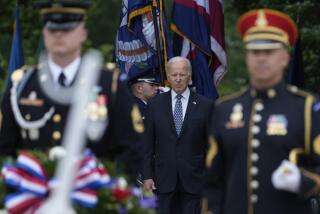Obama welcomes era of ‘equal partnership’ with Iraq
Reporting from Washington — With the last U.S. troops set to depart Iraq, President Obama on Monday welcomed a new phase of “equal partnership” with the Iraqi government, even as both sides admit uncertainty about how that will work.
“We’re here to mark the end of this war,” Obama said, appearing alongside Iraqi Prime Minister Nouri Maliki at the White House, and to “begin a new chapter in the history between our countries — a normal relationship between sovereign nations.”
The Obama administration faces a host of challenges in postwar Iraq, where the role of the U.S. military in providing future training and assistance for security forces has yet to be defined, beyond both leaders saying it was vital to Iraq’s long-term stability. Another uncertainty is how the U.S. troop departure will affect conditions between Iraq and its neighbor Iran, which could seek to fill the vacuum and increase its influence. Without mentioning Iran, Obama vowed that the U.S. will keep a strong presence in the Middle East even after American combat troops leave Iraq. Maliki has been adamant that Iraq will not allow interference as it charts its own future.
Sen. John McCain (R-Ariz.), a critic of the U.S. troop withdrawal, accused both Obama and Maliki of having “failed in their responsibilities” to protect shared interests.
“All of the progress that both Iraqis and Americans have made, at such painful and substantial cost, has now been put at greater risk,” said McCain, who blamed domestic politics in both countries for driving the decisions.
The political importance for Obama is considerable as he gears up his reelection campaign, as getting U.S. troops out of Iraq fulfills one of the signature pledges of his 2008 campaign. Obama’s week is filled with events to repeat that message, including a trip to Ft. Bragg, N.C., on Wednesday to greet returning troops. On Monday, Obama and Maliki placed a wreath at Arlington National Cemetery to honor the nearly 4,500 Americans killed in Iraq since the U.S.-led invasion started in 2003.
Obama said the U.S. will continue to have a strong diplomatic presence in Iraq, with an embassy that is somewhat larger than is typical out of concern for the security of its civilian workers.
The two sides will work to establish strong ties between the U.S. and Iraqi military, Obama said, like those with other partners around the world. They are making plans for American military personnel to train Iraqi security forces in how to use American-made weapons, though no specifics were announced. The administration notified Congress on Monday of its plans to sell Iraq 18 additional F-16 fighter jets. The U.S. this year had agreed to sell Iraq an initial allotment of 18 F-16s.
Both sides have an interest in working together on counter-terrorism and other matters, Obama said, raising the possibility of joint military exercises.
“The relationship doesn’t end with the departure of the last American soldier,” Maliki said.
Obama noted the sacrifices of American troops and civilians, as well as the Iraqi people, during nearly nine years to achieve “an Iraq that is self-governing.”
“I think history will judge the original decision to go into Iraq,” he said.
More to Read
Sign up for Essential California
The most important California stories and recommendations in your inbox every morning.
You may occasionally receive promotional content from the Los Angeles Times.











